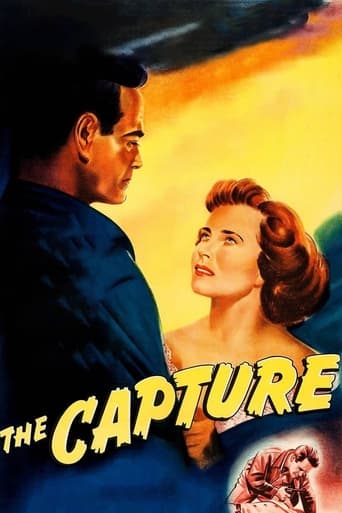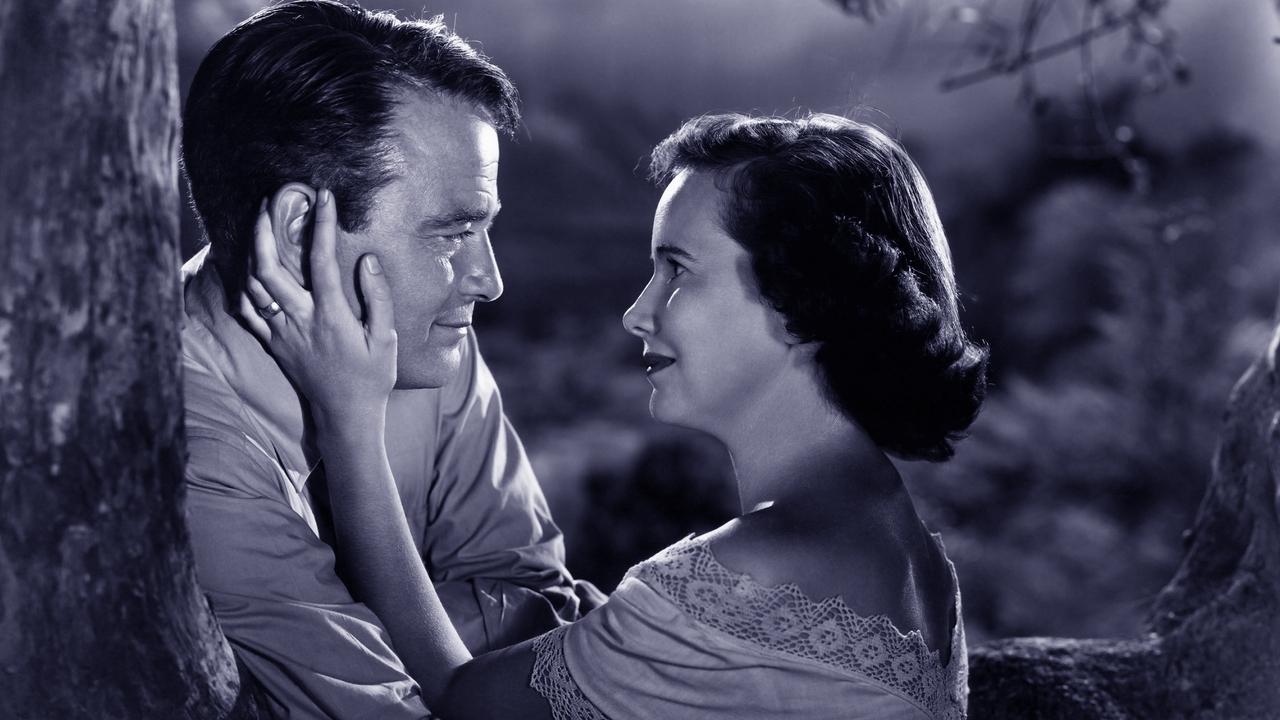Cristi_Ciopron
I have been quite impressed with this one; genre-wise, it's a romance. It's a noir western, but essentially a romance, and a very wholesome and lovable movie. John Sturges made this charming and very stylish noir western with an interest in rocky landscapes and generally a very good sense of the places, and a very intriguing lead character: the oilman, successful as an one man posse, then turned cowboy to help a needy family, but firstly to redeem himself, and to expiate, and also strongly drawn by the sick passion for a widow, this with a cheap script, and happily it's not Ford's sometimes extrinsic religion (even Jory doesn't play as one of the conventional priests of that age: Fonda or Malden), and, this strangely, not the religious behavior as a distorting and possibly misguiding of the white man's conscience. The style of the movie is very grounded (from the Spanish spoken by the Mexicans in the opening scenes, to the landscape and the unflattering style of the cast's acting); everything, very cinematographic, and very appropriate. It's a director's movie, of one who turns everything into straight cinematography.The plot is quite tenebrous. The leading character resembles physically his victim, and their relation is interesting, unto tenderness, as the chased man reposes peacefully. There's the character's narration, yet some things are understated, and he might be unreliable, to the effect of ignoring himself. What does he wish? He let go his fiancée, then all of a sudden falls in love with a widow.His wedding party was so endearingly modest; and once married, he starts his chase.Though given only a supporting role, Jory is the best of the cast.The special effects were done by the Lydecker brothers. And it's a very good looking movie.
mstomaso
Eleven years into his lengthy career (1938/9-1976) the great western director (Magnificent Seven, Bad Day at Black Rock) John Sturges was releasing four films per year. The Capture was one of his better 1950 products. Sturges was still searching for his niche, but he would find it later in the decade as the popularity of noir and other genres of the World War II era faded. Although far from a straightforward western, The Capture is set in early 20th century Mexico and is a nice example of solid western storytelling by Niven Busch (The Postman Always Rings Twice). The lead character, a middle-management everyman (Lin Vanner) played by Lew Ayres, is a man running from his own self-doubt and an inexplicable guilt complex. Early in the film, he pursues and captures a man with an injured left arm who everybody believes to have been involved in a payroll robbery which resulted in the death of several security men. When the law comes to take this man into custody, he can not raise his left arm in surrender and is shot. Vanner escapes to a remote Mexican village to resurrect his life, and finds himself investigating the incident that set him at odds with himself after falling in love with the alleged culprit's widow. Going any further with the narrative of this plot-heavy, thoughtful, film would be a spoiler, so I will stop here. I will only say that the film's rather abrupt ending is worth the wait. Although The Capture's morality is rather heavy-handed for a western, this relatively dark film successfully explores psychological reality, conscience and the unpredictability of life in a way that would do most of the noir directors of the 40s and early 50s proud. Ayres and the female lead, Theresa Wright, do solid work in what must have been a tough, low-budget production schedule. And Sturges' direction and cinematography, though not particularly innovative, are entirely mature. Sturges shows what a good director can do with quality material and the right cast. And as his career developed, he eventually found his niche in films which are often seen today as landmarks of the western genre. The Capture foreshadows Sturges' classics nicely.
GManfred
The Capture tries mightily but in the end it suffers from a meandering script which is too full of plot devices and contrivances. The result is shocking as it was directed by the great John Sturges, who directed some of the best action pictures ever made, including "The Magnificent Seven". It is a picaresque type of a story which might be called " the Adventures of a Guilt-Ridden Oilman". Lew Ayres in the lead role bounces from place to place, falling in love with the wife of a man he has killed while searching for the real payroll thief. As he is on the lam in the midst of his guilt trip, he is eventually discovered and must hit the road again. Eventually he ends up in the same straits as the man he has killed, even incurring an identical injury as the dead man.....Sorry. I dozed off trying to recount the drab, preposterous proceedings. At best, it is a curiosity which is about 20 minutes too long and stretches the credulity of the viewer to the breaking point. Lew Ayres was good and Teresa Wright was excellent, but even so a question arises; Did they do drugs while writing scripts in the 40's?
classicsoncall
The interesting twist to this story is that Lin Vanner (Lew Ayres) becomes the man he pursued and killed at the opening of the film. Not literally of course, but figuratively, in that he became entangled in a set of circumstances that made it look like he was guilty of a crime. It's the kind of irony, as another reviewer pointed out, that would have worked well as an episode of 'The Twilight Zone'. The middle part of the story explains how Vanner discovered the identity of the villain who engineered a payroll holdup and framed Sam Tevlin, the man who Vanner tracked and killed because he 'couldn't' surrender. What's difficult to buy about the story is how Vanner persisted in his effort to win over the widow Tevlin (Teresa Wright) in his quest for the truth about the man he killed.You know, as I think about the picture now, it might have been better served by reversing the roles of Ayres and Victor Jory, but my opinion might be shaped by having seen Jory in more movies. At that, I've probably seen him more times as a villain than a hero, and he would have given the character of Vanner a harder edge. Not that there's anything wrong with being introspective, but Ayres' interpretation made him too submissive to Mrs. Tevlin once she found out the truth about his identity.Once the story is well under way, you have a pretty good sense of what's coming up in the finale, the only question being whether or not Vanner would be able to successfully surrender. The intervention of Father Gomez (Jory) helped decide that outcome. You know, I had to chuckle to myself during the scene when Vanner confronts the Mexican laborer who was the payroll escort that got robbed to set up the story background. His name was Juan Valdez, and after seeing that Colombian coffee commercial dozens of times over the years, it's a name that's become synonymous with coffee breaks, not payroll robberies.


 AD
AD


